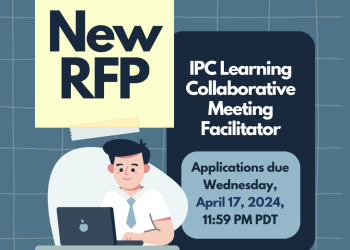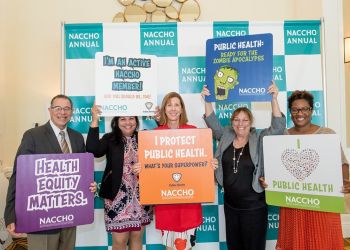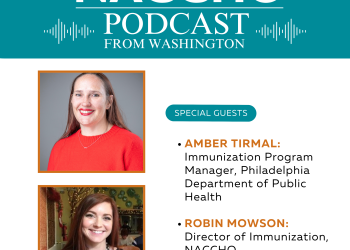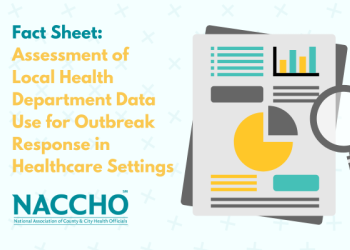 Interview by Taylarr Lopez, Communications Specialist, NACCHO
Interview by Taylarr Lopez, Communications Specialist, NACCHO
The National Board of Public Health Examiners (NBPHE) ensures public health professionals have the knowledge and skills relevant to the core areas of public health by administering a voluntary certification examination. Candidates who successfully pass the examination receive a Certification in Public Health (CPH), which demonstrates to employers that they have mastered key contemporary public health sciences. Now in its tenth year, NBPHE’s certification exam and resources are more relevant to the public health workforce than ever. Below, Allison Foster, MBA, CAE, President of the NBPHE, describes the benefits of being certified and highlights the resources candidates can use to help achieve certification.
Can you tell us about the National Board of Public Health Examiners (NBPHE)?
The mission of NBPHE is to professionalize the field of public health and credential professionals in the field. We assess the competencies and skills needed to work in public health and ensure that individuals embark in continuous education after they receive credentialing.
Why should public health professionals get certified?
There are many CPHs that get credentialed because they believe it can move the field forward. Public health is very diverse, and the people that work in public health have extensive backgrounds and degrees. This is the common denominator among everyone who is credentialed in the field. Sometimes it’s a little confusing for some people to wrap their head around what public health is. A CPH credential really identifies the field and it’s a signal that we’re all in this together and we’re working towards the same goal.
To be certified, you must be well-versed in different areas of public health. Wouldn’t it be great if the epidemiologist knew something about what the environmental health professional does, or the health educator understands a bit about biostatistics? Its important to know what your colleagues do, and we believe it brings a lot to the field.
On a personal level, there are two reasons I believe people seek certification. One is that people believe in credentials. A credential is a sign of achievement and employers look at them favorably. The CPH is starting to gain recognition among employers. We’re also finding that many employers are beginning to require a CPH certification. The other is that public health professionals believe in continuous learning. CPHs appreciate the incentive to pursue continuing education opportunities through trainings, workshops, and other events that get them outside of the office.
What resources are available to public health professionals who are seeking certification?
The NBPHE hosts a page on its website called Study Resources. We recommend that candidates first read our eligibility requirements and content outline. That outline is a map of all the possible topics that can be tested on the exam. It’s a good sign if many of the topics look familiar to test-takers. If they see sections that look completely unfamiliar to them, that’s a sign that perhaps they should take a class in that area and learn more about that domain.
We’ve also built a practice exam, so candidates can do an actual simulation. The sample questions give test-takers a sense of the format and what the test would look like. Unlike the actual exam that has 200 questions, the practice test only has 50 questions. Candidates can answer all the questions and at the end, they receive a report of which questions were answered correctly and incorrectly. It helps them to know which areas they need more practice on and what they need to focus on. There are plenty of resources on our website to help guide candidates. We host free, detailed webinars each year; one for each of the domains. We will be hosting a new series this summer. Also, users have access to archived webinars online.
The Association of Schools and Programs of Public Health also has a comprehensive study guide that’s available online. It includes three practice exams, definitions and terminology, and an overview of each of the domains. Additionally, we cohost a learning institute with the American Public Health Association at its annual meeting.
Since NBPHE’s inception 10 years ago, how has the organization evolved?
A lot has changed since the organization was established. It was a huge effort to launch certification for a field like public health. We’ve learned a lot from the CPHs. Originally the CPH exam was built around the five core areas of public health; epidemiology, vital statistics, environmental health, behavioral sciences, and health policy and management. Today, the exam is much more relevant to practice than it was before.
Practitioners participate in item-writing and the exam development process to help us ensure the exam is relevant to the public health workforce. In 2015, we implemented the job task analysis, which took two years to develop. It’s a survey to determine what tasks professionals are doing in the field. We formed a committee to review and develop a survey that was 200 tasks long. It was disseminated to the public health workforce and we received about 8,000 responses. As a result, we have a new outline that will be used in 2019, and it’s completely based on what public health professionals are doing.
Originally, we had one testing window a year, but now we have testing all year long. Almost six years ago, we introduced a recertification process, so now CPHs must recertify every two years. NBPHE offers digital badging and virtual certificates, as well as a book club and LinkedIn community for CPHs. Another interesting change is that there are now ten schools and programs that require a CPH for graduation.
How does NBPHE work with its partners to carry out its mission in certifying qualified public health professionals?
Every year, we create a new version of the exam, so the practitioners are heavily involved in the item writing process. The practitioners are trained to write standardized test questions. It helps that most of the writers are public health practitioners. We value the contribution of our partners and their perspectives. The job task analysis process is done every five years. It’s a big endeavor to get the word out about the job task analysis, so we rely on partner organizations like NACCHO to help us with that. We also have a database of continuing education opportunities. Almost all of them are partner organizations that provide continuing education.
What value does NBPHE find in collaborating with NACCHO?
We can’t accomplish our mission and make public health stronger without knowing what’s important to the field. If we didn’t have these partnerships, I don’t think the credential would accomplish its goal. We work to advance public health, and weare here for the workforce, not the other way around. There is a trend in public health among individual certification. I find that it is important to have standards for the workforce, including certification.
Check out these additional journal resources:
Advancing the Certified in Public Health Examination: A Job Task Analysis
Are Public Health Academia, Professional Certification, and Public Health Practice on the Same Page?





